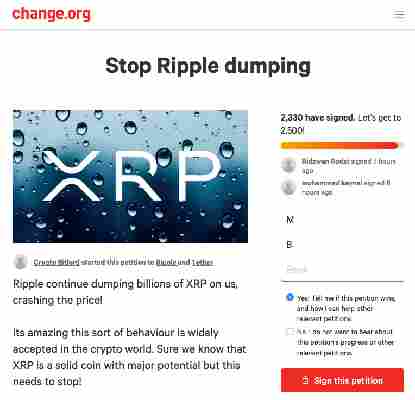We know cryptocurrencies are subject to wild price fluctuations, sometimes at the drop of a hat. Sometimes whales dump coins causing prices to drop, and one of the biggest XRP whales, Ripple, is being asked to stop dumping. Of course this will work.

A Changerg user going by the name of Crypto Bitlord started a petition earlier this month asking Ripple to stop dumping its XRP holdings. So far it’s been signed nearly 2,500 times.


“Ripple continue dumping billions of XRP on us, crashing the price!” the petition reads.
It seems Crypto Bitlord genuinely believes in XRP as a ‘cryptocurrency,’ calling it “a solid coin with major potential.” They later go on to refer to the XRP as a “quality coin.”
The petition’s owner is taking issue with the fact that Ripple, one of XRP’s biggest holders, is dumping coins and driving the price down.
“The only logical explanation is that Ripple are dumping on us. And not small amounts either. Literally billions. We have seen the reports of them disclosing this so it’s a fact,” they added.
It seems all they want is for XRP to reach its all time high prices that were seen during the 2017/2018 bull run. In January 2018, XRP traded at over $3 per coin, it’s now trading around $0.30 per coin.
Back in July, Ripple‘s Q2 report disclosed that the company had sold $106.87 million and $144.64 million worth of XRP in institutional direct sales and programmatic sales respectively.
Research from cryptocurrency news outlet The Block reported a similar story for Ripple Q1 . According to the research, Ripple sold $890 million worth of XRP with most of that (65.6 percent) going to institutions and the remainder (34.4 percent) being sold to exchanges.
It’s an interesting quandary Ripple holders find themselves in.
On one hand, Ripple‘s primary customers are institutions like banks. Ripple must sell XRP to these customers, so they can use the token in the company’s global remittance platforms. When Ripple sells XRP to these institutions, it shouldn’t come as a surprise.
It’s a business model that’s made Ripple‘s top executives very wealthy indeed .
That said, XRP is listed on most cryptocurrency exchanges, and according to CoinMarketCap, is one of the top three coins by market cap. But what does that matter when Ripple owns a sizable portion of the XRP and ultimately controls the flow of coins?
It’s a dilemma that has led many to question whether XRP is even a true cryptocurrency. But one thing’s for sure, XRP holders are pissed.
Russians (not North Koreans) thought to be behind $530M Coincheck hack
The $530 million hack that blighted Japanese cryptocurrency exchange Coincheck in January 2018 may have been carried out by Russian hackers.

A virus thought to be used in the hack has been found on employee computers and is linked to Russian hacker groups, the Asahi Shimbun reports .
The hackers allegedly emailed employees with malicious files, including the known Mokes and Netwire malware, which grant attackers remote access to infected systems.
It’s believed that employees inadvertently, or unknowingly, installed the viruses onto their machines. As a result, attackers were able to gain access to and manipulate the company’s security keys to steal the cryptocurrency.
The attack was previously thought to be the work of the North Korean hacking group Lazarus .
However, both of the malwares emailed to Coincheck employees have been linked back to Russian hacking groups, and have previously appeared on Russian-based message boards. Mokes was first seen on a Russian bulletin board in June 2011, Netwire has been active for around 12 years.
Coincheck lost over $500 million worth of NEM tokens as result of the hack. At the time, the exchange didn’t verify how attackers had managed to pull off the heist, but the company was adamant that it wasn’t an inside job .
Devs say real blockchain use is coming, but many feel it’s overhyped
We’re likely to see a real-world application of blockchain technology over the next two years – if recent research is to be believed.

More than 23 percent of developers out of the 71,281 who contributed to HackerRank’s 2019 Developer Skills report said the”real-world” application of the technology over the next 24 months was very realistic.
Some 27.54 percent said they thought it was somewhat realistic, 21.89 percent were unsure, 19.77 percent felt the technology was overhyped, and only 7.01 percent thought it was unrealistic.
IoT and deep learning
Before you get too excited, though, the report predicted that the Internet of Things (IoT) would be the most adopted technology over the next couple of years.
There are many reasons why developers think things will play out this way.
Firstly, unlike blockchain, which is still nascent, IoT’s adoption is being driven by the increasing connectivity of homes, cars, and cities.
Deep learning, a form of artificial intelligence (AI), has also proved unsurprisingly popular among developers. The technology is working its way into mainstream industries such as automotive – think driverless cars – and healthcare, where artificial intelligence is leveraged to diagnose, treat and even prevent disease.
Getting there
Blockchain technology is being increasingly trialed and piloted by mainstream institutions across many sectors, but it seems the technology is yet to stick.
Banks are seemingly interested because private decentralized ledgers could result in maximum efficiency – especially in the trading and clearance of shares – and lower costs.
The technology also has potential in other industries such as healthcare, where it’s being used to fight counterfeit drugs .
Traditional energy companies are exploring the technology, too. In fact, Spain’s Iberdrola recently completed a pilot in an attempt to track renewable energy more efficiently.
If the trials and tests cant convert to real-world applications, we might see the number of devs who think blockchain is overhyped grow even higher.











